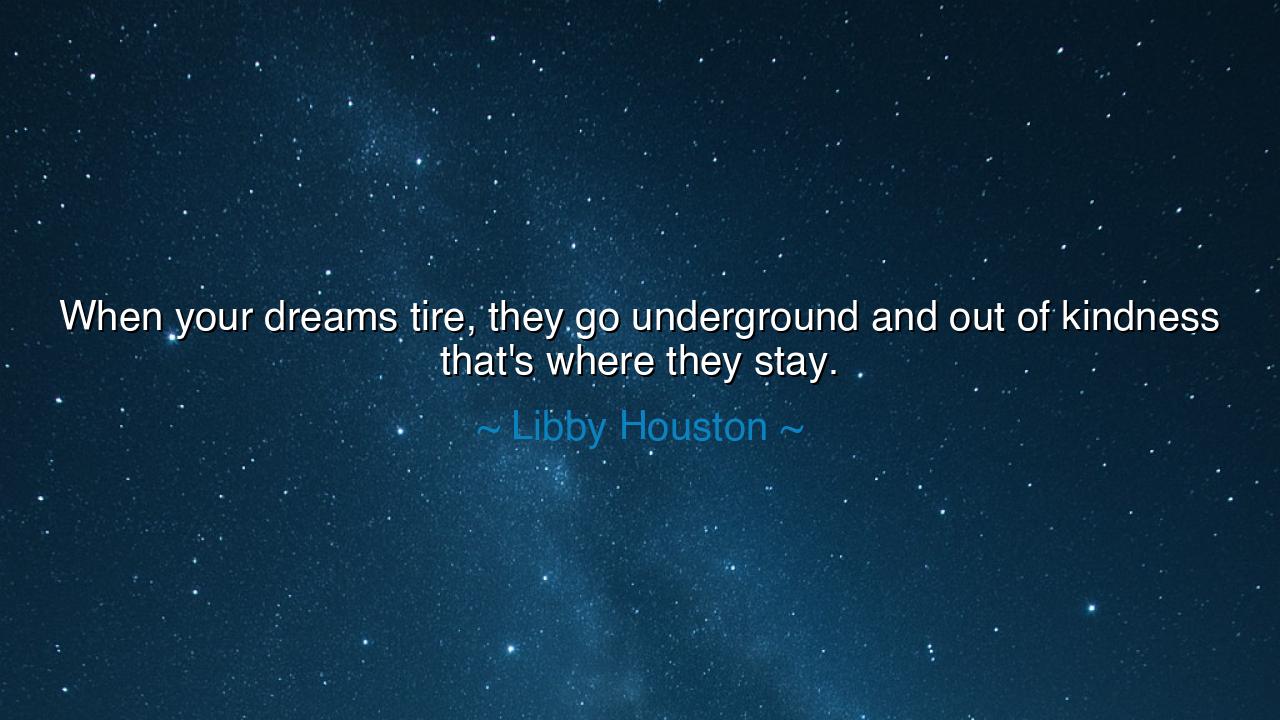
When your dreams tire, they go underground and out of kindness






The poet Libby Houston, with her quiet insight and haunting grace, once wrote: “When your dreams tire, they go underground and out of kindness that’s where they stay.” In this single line, she captures the tender sorrow of human ambition — the truth that dreams, like living beings, can grow weary, can fade from the light, and yet, in their retreat, show us mercy. For there is a moment in every life when the fire that once burned so fiercely dims, not from failure or defeat alone, but from the natural exhaustion of the spirit. Houston’s words remind us that even in rest, even in silence, our dreams are not dead. They descend into the depths of our being, waiting, protecting us from despair until we are strong enough to awaken them once more.
The origin of these words lies in Houston’s poetic vision — her ability to see the invisible rhythms of the inner world. A poet and scientist of the soul, she often wrote about the delicate relationship between passion and patience, about how the things that give us life can also wound us if held too tightly. Her reflection is not one of resignation but of compassion. To say that dreams “go underground” is to recognize the cycle of creation — that every living force, even imagination itself, must sometimes retreat into darkness to renew its strength. The earth teaches us this: winter buries what was bright, not to destroy it, but to prepare it for spring. So too do our dreams rest beneath the soil of our consciousness, gathering quiet power.
When Houston says our dreams do this “out of kindness,” she gives the image a soul. She suggests that even our lost or forgotten desires act in love toward us. They do not vanish in bitterness, but step back gently, understanding that the heart cannot forever live in pursuit without rest. This is a profound kindness, for if every ambition burned eternally, we would be consumed by longing. The mercy of forgetting, the soft surrender of the tired dream, is a form of self-preservation. Our deeper wisdom knows when to hide its treasures from us — when the time is not right, or the soul too bruised to carry the weight of desire.
History offers countless examples of this truth. Consider the artist Vincent van Gogh, whose dreams of success and recognition seemed to abandon him during his lifetime. His passion burned until it broke him, yet even in his final years — when hope seemed underground, when the world did not yet see his brilliance — his dream did not die. It merely slept within the future, waiting to rise again in the hearts of others. Today, his art speaks across time, a resurrection of a dream once buried. His story reminds us that dreams that go underground do not vanish; they transform. They take root in silence and bloom in seasons yet to come.
There is another wisdom here, too — that we must allow ourselves to rest from striving without shame. The ancients knew this balance well. They honored the gods of sleep and renewal, believing that even heroes must lay down their swords and tend to their spirits. In the same way, when our dreams tire, it is not a sign of weakness, but of the natural ebb of vitality. To rest is not to fail; to pause is not to abandon hope. The dream, like the seed, knows its time. In patience and humility, we honor its rhythm.
Yet, Houston’s line also carries a quiet warning. If our dreams go underground and we never look inward to find them again, they may remain buried forever. The act of remembrance — of returning to the inner soil — is ours to undertake. When the storm has passed and the heart has healed, we must have the courage to dig gently into that earth, to unearth the visions we once cherished. The dream that once slept for mercy’s sake must, in time, be awakened for life’s sake. Otherwise, we risk living only half-awake, surrounded by the ghosts of unlived possibility.
So, my children, the lesson of Libby Houston’s words is one of both tenderness and strength: learn to honor the seasons of your own soul. When your dreams grow weary, let them rest. Do not chase them into the dark or curse them for their silence. Trust that they have gone underground for your healing. But when the light returns, do not forget them. Go to the quiet places within you and call them back, refreshed and reborn.
For a dream, like a root beneath the earth, will wait for you. It will not die if it was ever true — it will simply sleep until you are ready to dream it again. And in that sacred rhythm — of passion, rest, and resurrection — the wise find their balance, and the heart learns its greatest truth: that even silence can be an act of kindness, and even buried dreams still grow toward the light.






AAdministratorAdministrator
Welcome, honored guests. Please leave a comment, we will respond soon